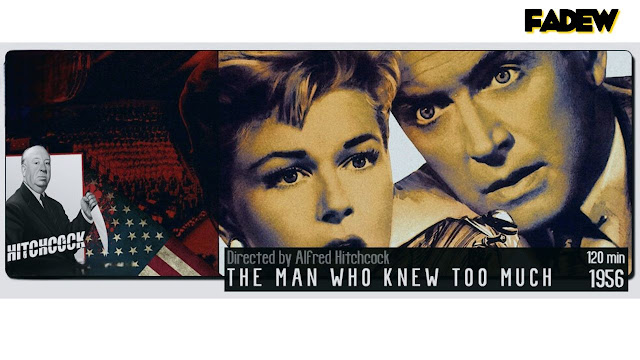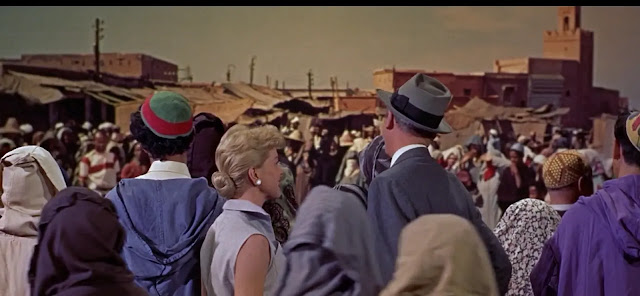New York Times critic Bosley Crowther's 1956 review of Alfred Hitchcock's "The Man Who Knew Too Much" started off by declaring the legendary director had "shamelessly reverted to an old story and to the cinematic style that made him famous in the Thirties." This blunt yet bold lead implied Hitchcock had taken an uncreative approach by revisiting a previous film of his, eventually failing to resist the confession that he understood the temptation, even masters cannot always resist reworking formulas that secured their fame.
James Stewart and Doris Day in Technicolor make for an appealing lead couple as Dr. Ben McKenna and his wife Jo, find themselves embroiled in an international conspiracy while on vacation in Morocco with their son Hank (Christopher Olsen). The polished actors effortlessly slide into their everyman roles of parents whose lives are thrown into chaos by disturbing outside forces. Their frantic efforts to save their kidnapped son from assassins provide the propulsive force driving the film's plot.
This was my second viewing of this 1956 remake of the 1936 film of the same name.
Stewart and Day are perfectly cast in their everyman roles of an American couple thrust into extraordinary circumstances beyond their control. Their natural rapport and charm establish them as likable and grounded characters from the beginning. When darker forces disrupt their family vacation, Stewart and Day sell the panic and desperation of parents who will stop at nothing to protect their child with deeply felt and compelling performances.
Their strong on-screen bond also thickens an extra layer of dramatic tension, as we become invested not only in the survival and well being of their son, but also in preserving the joy they had found together before any tragedy struck.
Though the central premise of a child's abduction may seem dated or exploitative to modern viewers, Hitchcock frames the story with a light touch that brilliantly exhibits the humor and admiration in Stewart and Day's characters over melodrama.
Their charming and natural performances add to the film's enjoyability. While many Hitchcock films inhibits tension from mysterious or somewhat unlikable protagonists, in this film he roots us firmly in the parents' anxiety and determination through their grounded yet authentic charisma.
Hitchcock wisely directs both actors to play their roles with humor and humanity even in the most dire of scenes. While other filmmakers may have leaned too heavily into tears or dramatics, Hitchcock understands that audiences will empathize most with characters we can relate to and occasionally smile with.
As with many late-period Hitchcock works, meticulous craft and technical precision outshine explosive cinematic imagination. But elegant set pieces like the iconic concert hall climax still pack visceral wallops nearly sixty years later with their precision-engineered blending of music, imagery, and rising panic.
Hitchcock establishes himself once more as a total maven of manipulation, that is, his facile striking of fear among the audience and concern them through subtle maneuver of soundtrack, editing, and mise-en-scene.
Nowhere is Hitchcock’s meticulous devotion to his craft more apparent than in the climactic London concert scene. With its perfect synchronization of swelling music, rapid editing between close-ups of Stewart and Day’s panicked faces, and long shots of the massive, indistinguishable crowd, it stands among the most brilliantly orchestrated (no pun intended) sequences in the director’s oeuvre.
The fastidious audience who always seek out intricate themes, story telling, and of-depth character studies in every outing may find this adventure somewhat lightweight. But when judged solely as an old-fashioned thriller designed simply to entertain one's evening, this remake succeeds relatively well, thanks to Hitchcock's dexterous hand.
The fastidious audience who always seek out intricate themes, story telling, and of-depth character studies in every outing may find this adventure somewhat lightweight. But when judged solely as an old-fashioned thriller designed simply to entertain one's evening, this remake succeeds relatively well, thanks to Hitchcock's dexterous hand.
The film has an over-the-top (but fun) suspenseful storytelling that moves pretty fast and, despite some familiar Hitchcockian traits, still can surprise viewers with its clever twists. For fans of the director's body of work or those simply in the mood for solidly crafted genre filmmaking, this will continue to satisfy.
In the end, even when working with well-worn material, Alfred Hitchcock's skill was in making the familiar feel fresh, and the expected become exhilarating. "The Man Who Knew Too Much" showcases that the Man is still fully in command of his thriller mastery, even when not reaching the almost an apotheosis level of heights of some of his other films.
It's an entertaining way to spend evenings for those seeking quality entertainment from a true master of suspense, it surely was for me spending my birthday. Even after multiple viewings, the film retains its ability to surprise thanks to clever reveals only Hitchcock could devise. Hidden in familiar narrative beats are provocative grace notes that challenge preconceived assumptions, keeping viewers perpetually one step behind the story’s machinations. It is the work of a master craftsman working at the top of his game.
In the end, even when working with well-worn material, Alfred Hitchcock's skill was in making the familiar feel fresh, and the expected become exhilarating. "The Man Who Knew Too Much" showcases that the Man is still fully in command of his thriller mastery, even when not reaching the almost an apotheosis level of heights of some of his other films.
It's an entertaining way to spend evenings for those seeking quality entertainment from a true master of suspense, it surely was for me spending my birthday. Even after multiple viewings, the film retains its ability to surprise thanks to clever reveals only Hitchcock could devise. Hidden in familiar narrative beats are provocative grace notes that challenge preconceived assumptions, keeping viewers perpetually one step behind the story’s machinations. It is the work of a master craftsman working at the top of his game.
While not quite reaching the heights of some of Hitchcock's most daring, ruminating, and artistically complex works, this remake of his own film is a tightly-paced, entertaining diversion that reminds audiences of Hitchcock's skill even when working with more familiar material.
Rating: ★★★1⁄2 (3.5/5)
The cover was done by Rodney Twelftree of fernbyfilms.com
Disclaimer: This article contains links to third party websites which we do not control or endorse. These third party sites may use cookies, trackers or have their own privacy policies that we are not responsible for. Please read the privacy policies of any site you visit carefully before providing personal information. While we aim to provide only quality links, we do not control or take responsibility for the content or privacy practices of any third party websites linked from our site.






2 Comments
This is one of the best reviews I have come across in the last few months. I can see Fb public is not growing crazy about it, but they will cheer for you, in time. Just keep creating these wonderful, brisk but hard-hitting and deep reviews.
ReplyDeleteHappy Birthday, captain
-Via Facebook
That intro to the review was such a creative approach.
ReplyDeleteSome comments may go through moderation before appearing and are subject to our community guidelines, which can be viewed here. NB: All times are in Pacific Standard Time (PST).